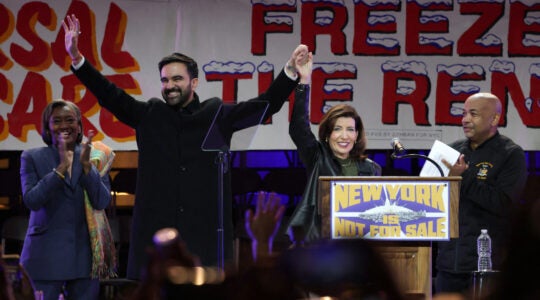Can Jewish religious life be full and fulfilling with no connection to Israel? Must a connection to a concrete Israel live separate from synagogue worship? Should our religious rituals ignore Israel in any way other than the metaphorical, or should it accept that the establishment of the State of Israel affected not just Jews but also Judaism itself?
A few weeks ago I tried to ask these questions through the prism of a Friday-night service at Romemu congregation. I wondered whether the form of worship Romemu exemplifies is conducive to making Israel available to the congregants’ Jewish experience. As an Israel educator, I wondered — and still wonder — if a Friday-night service should or can aim to bring Israel closer to its participants?
I blew it. From the responses I received, it is obvious that I not only failed to make my question clear, but I also managed — entirely unintentionally — to offend people. I miscalculated how the intolerance of the Israeli Orthodox establishment has ensured an Israeli voice — even a progressive one like my own — is not welcome when asking questions of progressive Judaism. As a result I fear my article was read very differently from the way it had been written.
Allow me to correct two key misapprehensions, and go on to ask the underlying question.
First: My concern was not whether the service was open to visiting or member Israelis (of course it was!). My concern was whether, through the service, the congregation was able to express to itself a relationship to Israel: the country, the land and its people. I wondered how the worship itself might inspire a connection to the Jewish homeland.
Second: In pointing out that most Israelis would feel culture shock at a Romemu service, I was offering a description of a state of affairs that unfortunately happens to be true, but I was certainly not ascribing blame to anyone in North America.
So what was I trying to say? I was trying to say that the State of Israel exists. It has existed for the last 65 years, but it still hardly exists in the synagogue service.
As if Jerusalem is still only a spiritual concept. As if liturgy that talks of power or revenge exists only in thought not deed. As if Yom Kippur has nothing to do with the Yom Kippur War, as if Tisha b’Av has not become multivalent since 1967, and as if shmitta lives in our souls with no reference to the land for which it was intended.
Where is the religious renewal that addresses Israel in its worship? Who is sharing the progressive prayers that embrace and wrestle with a concrete Israel “shel mata” (on earth)? Where do non-Orthodox forms of worship take on the challenge of an Israel that is real, and how might they spread?
There are clearly pioneers out there. B’nai Jeshurun recites its Musaf HaShalom on Rosh HaShanah, and concludes Yom Kippur with “Hatikvah.” Temple Adas Yisrael incorporates Yehuda Amichai poems into its Friday-night services, and Hazon’s holistic approach to shmitta addresses the Land of Israel as an organic aspect of their project. How can we ensure these initiatives may thrive?
We at Makom are no experts in creative forms of Jewish worship. But North America is full of people who are. Romemu is bursting with them. If anyone is equal to this task, it is the kind of people who are fearless, creative, teeming with spirit. We look forward to learning about — and helping develop — all initiatives in this direction.
Robbie Gringras is artist in residence at Makom, the think tank of the Jewish Agency for Israel. www.makomisrael.org
The New York Jewish Week brings you the stories behind the headlines, keeping you connected to Jewish life in New York. Help sustain the reporting you trust by donating today.




